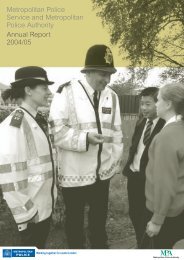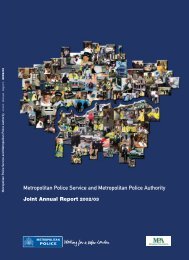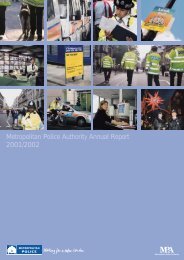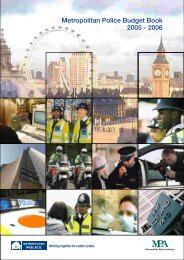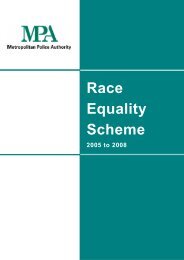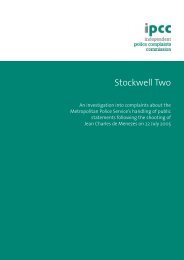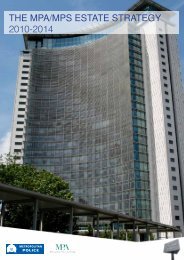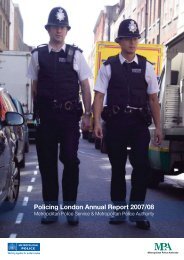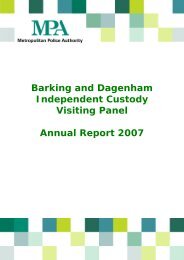Dr Richard Stone
Dr Richard Stone
Dr Richard Stone
Create successful ePaper yourself
Turn your PDF publications into a flip-book with our unique Google optimized e-Paper software.
MPA Race and Faith Inquiry<strong>Dr</strong> RICHARD STONE6 APRIL 2009Chair: Cindy ButtsPanel Members: Bob Purkiss, Margaret Blankson and Anthony JuliusThis cassette has been proof read and names inserted only where identity is certain.CBSuffice to say we’ve got Anthony, Margaret and Bob, we’ll all be asking you questions and atthe end we’ll give you an opportunity to say anything that you haven’t had the opportunityto say. We’re taping the session so if you just leave that microphone on and we’ll give youan opportunity, maybe in a week or so’s time, to review the evidence you’ve given us andjust to a—approve itRSSureCB..as a correct record. Can, can I start by asking you what in your view are the biggestchallenges for the Met and specifically in relation to race and faith issues?RSWell, as you may know I, I’ve spent the last year doing a listening and visiting exercise to findout what I, seemed to me from a personal point of view, had improved or changed in thelast ten years. I was fortunate that I didn’t have to go into all the data and statistics becausethe Runnymede Trust, I commissioned them to do their review as well. And this allowed meand my supporters to – my advisers to go round thinking and listening. And the thing thatreally came across to me was that there’s been a huge improvement in professionalism atthe Metropolitan, Metropolitan Police in particular, but the police in general in the last tenyears. And the example, for example is that the Senior Investigating Officer in the originalmurder investigation of Stephen Lawrence was totally incompetent, had no initiative, reallywasn’t very bright and in our view and we say, say in our report, in the original reportStephen Lawrence (inaudible) been promoted beyond his ability. But now it’s quite clearthat that sort of thing would be impossible, to have a Chief Superintendent at that sort oflevel who was as incompetent as that, clearly that officer was. Went to a sitting for exampleof the Criminal Training, Criminal Investigation Training at Hendon and saw their Hydracomputer program at work and it’s very highly professional. There’s been a hugeimprovement in professionalism (inaudible) all round, except in these two areas, which I’msure you’re aware of – the two that most impact negatively on black and minority ethnic1
communities which are despatch to stop and search and in employment prac— recruitment,retention and progression of black and minority police, police officers were of course there’sbeen virtually no change at all. The same amount of energy and time had gone into all thoseareas, including those two areas, but those are the only two areas where there’s beenthere’s no improvement at all. And that seems to me to be, (inaudible), the institution hasfailed if you like, black and minority ethnic communities both as service pro‐‐ as a serviceprovider and as an employer, and so the institution has failed and it’s probably due toracism, so that’s called institutional racism, so I still stick with the concept of institutionalracism. I don’t really care what you call it – institutional racism or (inaudible) Trevor Philipssays, systemic bias. Actually I think if you’re going to use the word systemic bias, you mustuse the R word and say systemic bias by racism if you want to; and it’s easy to use the word.Or you can just deal with it. I came across an, an example in Birmingham, Alum Rock areawhere the, the Borough Commander’s made exactly the sort of changes in professionalismconnecting these minority communities. He never used the word racism at all. He’s justimproved relationships with the local communities and it’s paid off extremely well. And inmy report it says in Appendix 3 it describes it altogether. Have you got any copies(inaudible)?Yes, we do, we all have copies, thank you.RSYou do. Good, thank you. Well that story, at Appendix 3 is just fantastic, it seems to me. SoI made ve—several re—recommendations on in, (inaudible) addressing institutional racism,my 4, 5, 7, 8, and 9 are all to do with that. So that’s I think the two areas which I think arethe most necessary for the Commission‐‐, new Commissioner to deal with.You mention there the example of Birmingham, is that right?RSYes, this Borough in Birmingham, yes.In Birmingham, yes. And you and you mention that I think also during the NPIA conference,as well.RSThat’s right, yes.2
But that’s very much in relation to external service delivery which of course is absolutelykey. Our key focus for the Inquiry is very much around the internal issues whichRSI understand that’s (inaudible) employment particularly for race and faith.(Inaudible) yeah, yeah.RSYou see the interesting thing(inaudible)RS..is, I asked him about exactly thatMmRS...(inaudible) Commander and he’s had virtually no employment tribunals against him, in thethree years it has been there. So if you like that business of, of connecting with minoritycommunities has meant that, (inaudible) police officers from that background don’t feel it’snecessary or, it’s obviously changed employment practices, ‘cause in (inaudible) neigh,neighbouring Hounslow they have had some examples of that (inaudible) employmenttribunals from black and minority ethnic officers. But in Alum Rock, virtually nil.MmRSSo I think that it’s, it’s, it’s we, in the Lawrence Inquiry used the terms appropriate andprofessional behaviour. I think appropriate and profession—professional behaviour inservice delivery impacts on employment, and employment impacts on service delivery. Sothe two go hand in hand and that’s what these two major areas – despatches and stop andsearch, unemployment, that’s why they’re so linked.3
Ye—yes, I agree with that. I think I agree with that whole idea about, about the internalreflecting on the quality of service that people are given externally, but I just wonderedwhether or not using that example, whether or not you could drill down into the internalelements that, that mean that, that meant that that was in a, (inaudible) a success, sex,(inaudible) cur‐‐, success in your eyes, sorry. Are, are you, do, do, do you see what I’msaying? What, what, I, I’ve read your report and what, what you’ve done is, you’ve talkedabout the e—external elements of that good practice that you’ve highlighted but I’m tryingto drill down as to what made that a success in your eyes, in terms of the, the practical sortof internal workings within that Borough Command.RSTom Cooke, the Senior Police Officer who was on the Stephen Lawrence Inquiry, s‐‐ told usthat in his view, a, a racist officer is an incompetent officer. And anybody who’s acting inway discriminatory like that, it’s actually incompetent. It’s a waste of time and waste ofeffort. So I think that that, that’s as simple as that. You, you can focus very much on theproblems within the police services. In my concern is that the last, the, the MetropolitanPolice Commissioner had to go just after the Tarique Ghaffur affair which in my view heshould have settled years ago. It’s obviously been a long running problem between thosetwo people. And he failed to do so. I think he was rather waiting for a new Commissioner,perhaps to take, deal with the problems of racism, well, (inaudible) this is the newCommissioner. I spent an hour with him the day after my report was launched and he sayshis priorities are all to do with security and anything else is another agency’s problems. Ithink he’s wrong. I think if he doesn’t deal with racism (inaudible) particularly inemployment can explode in his face as (inaudible) Ian Blair – he lost his job (inaudible),largely as a result of that.MBSorry (inaudible) repeat what you just (inaudible)RSBeg your pardon?MBCould you just repeat what you just said? I, (inaudible) I missed that.RSSorry. I’m just saying that I, I, I don’t know the ins and outs of why exactly Ian Blair went,but certainly there was, it was just immediately after the failure for him to deal with theTarique Ghaffur problem which it seems to me had been going on for many, many years andhe never really got round to addressing it. You leave these issues aside, if you don’t addressthem, at your peril, ‘cause after all, every year really, in the last ten years, there’s been someexplosion somewhere due to failure to address problems of employment of black and4
minority ethnic officers. After all, there’s the Secret Policeman’s program, then five yearslater a repeat of the Secret Policeman’s, or review of that, then the Tarique Ghaffur. Andthere’s always things, every year there’s something that explodes in the faces of theCommissioners. I don’t think that Sir, Sir Paul Stevenson really recognises the need that hehas to put these very high on his, his agenda and I think he’s got to be promo‐‐(inaudible)finding ways of (inaudible) officers.MBDid you say something about, I met with him and he ... I, that’s the bit I missed. I met withhim and he said, to..RSSir Paul’s, I went to Sir Paul’s,MBYes, that’s itRSPaul Stephenson had an hour with me.MBYesRSI don’t know why he gave me a whole hour, the day after our report was launched, but youcan surma—surmise that as well as I can. But certainly he’s, he, he, was saying to me thathis main priorities are purely security, security of the, the, the country, security of hisofficersRight, yesRS..and security of – what is it? – the security of the ‐‐ Londoners, that’s right. And every,everything else he said was really to do with other people. I was talking about things like theRoyal Commission on Police or other of my recommendations like having a university levelqualification, before you get promoted – I changed my mind, now. It’s not just Sergeant(inaudible) when you, you get promoted to Inspector, or you go into one of the elite squads.Sorry, I changed that slightly but what I’m just saying is, he was saying that’s not fitting5
RightRSThat’s for somebody else to deal with.MB(inaudible)(inaudible)(inaudible) should be for everybody’s benefit.RSI think the aspiration(inaudible)RSI think it should be an aspiration for all of us, seems to me. (inaudible) there are, areofficers who definitely don’t want to do that, in which case they should not be penalised forthat.MBThe reason I, I thoughtRSI’m sorry, sorry, I’m moving aside into something slightly different. We’ll come back to thatin a minute.MBS‐‐‐ (inaudible)RSI’m just saying that the problem is that it seems to me the police has, the, the Commissioneris very narrowly focused.6
MmRSI think he’s got to take on racism in employment.MB(inaudible) just hold on a second. Just so I don’t miss what you’re saying.RSYeahMBNow I think really quickly, but I think you spoke quite quickly so I missed something.RSYeahMBI’m correct in understanding that what you’re saying is that what, yeah, one of the outcomesor one of the points that was made by the Commissioner in your meeting with him the dayafter your, your Report was published was that you felt that its focus was securityRSYuhMB..and that the issues around diversity, of what other ‐‐ were for other people, otherorganisations.RSHe said he’s been dealing very well, his staff officer comes from a minority background andhe was saying, We’re doing all the sort of things that are necessary, everything’s going wellthere and it’s not really, the real priority has to be security. That’s what he was saying.MBOkay.RSI’m sure he’d verify the (inaudible) only just in, in a discussion so it’s not sort of hard and fastwhat he was saying, but that was7
MBOkayRS.. his very much his, his focus so when I talked about this aspiration for university levelqualifications, for police officers, he was quite interested in the idea but really, he said that’sfor other people to implement, it’s not for me.MBWho did you understand the other people to be.RSWell in that case he felt it should be funded, presumably, by the Education Authorities. Itprobably would be but on the other hand, I think people should be, coming back to that,that issue itself, I think people should be extracted from, from policing to be able to do theirMmRS..university level qualification, so I don’tMmRS(inaudible) SC policing (inaudible). So they should be relieved of their duties to do that,whilst they, they go and study but they’re, they’re the actual course fees would probablyhave to be paid out of the university (inaudible)MB(inaudible) focus on one bit and then I’ll, I’ll sort of pass you backRSPlease.MBSo, you were saying that you felt that that approach in terms of feeling that theresponsibility in relation to diversity was for other people, or other agencies issue was, yousaid, you spoke about his (inaudible) I’m really sorry I didn’t hear you.8
(inaudible)MBSorry what <strong>Dr</strong> <strong>Stone</strong> said.(inaudible)So you were sayingRSI’m saying if he’d ignored the, the issuesOkayRS..of, of, of racism and the problems with black police officers in particularOkay. Okay.RS..(inaudible) at your peril.Which, which but I don’t want to hold you to that discussion that you had(inaudible)..as you say, it was a veryYeah9
..fairly brief discussion that you had(inaudible)..with the Commissioner. But I do want to ask you about what your views are, given yourexperience and in particular given your involvement in the Lawrence Inquiry, what type ofleadership is required in order to move the Service on?RSThe Leadership has toWhat’s the style, how, what’s the approach, what should that leadership look like?RSLeadership has to be that, it, it’s, it’s an issue with which the leading officials are comfortablewith and you should feel that the Commissioner in particular, in London should becomfortable with working with black people, who should be valuing black people as I’ve saidin my report, he should be promoting the contribution of second and third generationminority people in this country and welcoming multiculturalism or whatever else (inaudible)definition he has. I don’t mind but he must have definitions. He must accept, havedefinitions which he can sign up to, so that he can actually acknowledge these things and beseen to be promoting the whole agenda week after week or month after month. Otherwise,we’ve going to find a lot of more problems with tribunals, with people leaving the policeofficers, police force, more anger and yet there’s this huge commitment of people like forexample Sergeant Virdi who after all the troubles he went through, went back in again. AndI, (inaudible) asked him, Why have you gone back in again? He says, I want to make thechange. Want to change (inaudible). It’s – there’s a huge well of good, good, good wishingfor, from black police officers, it seems to me in the Services. That’s why they stay in. Butit’s not acknowledged and that’s what I want; I want to see the acknowledgementOkayRS..and the welcoming.Okay. I’ll hand over to Anthony, please.10
AJYou’ve come at this authority from the point of, sorry, you’ve come at this historically fromthe point of view of race issuesMmAJ..and we’re now struggling to understand the question of faith and faith discriminationissues,RSWhich you and I can know quite a lot about.AJWe try, but, but the – one of the problems is that, is that faith is being assimilated to therace paradigm where it doesn’t nec—I mean it might be appropriate to do it, but it seems to,that seems to have happened unreflectively; faith discrimination, faith issues generally, havesimply been bolted on to race issues, so that the talk is of BME officers, as if, as, as if anIranian, a person of Iranian Muslim extraction, faced identical problems to a, AfricanCaribbean person, for example and in‐‐ intuitively that feels wrong, not just becauseeveryone’s problems in some degree are different because there are category differencesbetween one kind of problem and another. Post‐7/7 there are specific Muslim officer issues,Muslim officers are addressing them, whether they’re white or black or some shade inbetween, that had no bearing on the experiences than more historical experiences of blackofficers – black in, in the what was at any rate, the received sense of African Caribbean Asiansubcontinent. I wonder what your experience is of them?RS(inaudible), as you probably know I was on the original list, I’m a (inaudible) Commissioner ofthe Runnymede Trust until 1987 and I revived that Commission in a low, deliberately low keyway 2000 and 2004 so I’ve been listening (inaudible)AJI know, but they kind of run in your, your expertise is running, as far as I can see, (inaudible)running in parallelRSWell, exactly, yes11
AJ(inaudible) parallel courses.RSYes, yes. Mean my, my, my, view is that Islamophobia is a new and modified kind of racism.It is nonetheless, it comes under the heading of racism in my view. It’s a different kind ofracism, but a lot of the threads are very similar or the discrimination, discriminatorypractices, the, the holding people down, the, the negative stereotyping, a lot is very similarbecause there are specific things as far as Jews and Muslims and Hindus and everybody elseis concerned, depending on their backgrounds and whether this is ‐‐ religious discriminationwhich is based on colour as well as not on colour. They’re all overlaps but nonetheless thebasic (inaudible) ex, abuse of power and the exercise of discretion which is how it seems tome institutional discrimination works, is in the exercise of dis—of discretion. The samemechanisms apply so we’re coming back to Tom Cook’s racist officer being an incompetentofficer, an Islamophobic officer is equally incompetent for the same sorts of reasons; theywaste police time chasing after people who they shouldn’t be chasing after. Or stereotypingpeople in ways that don’t actually help. So I think,AJWhat would be a, what would I mean what would be an example of an IslamophobicRSWell I think that institutional ideaAJ(inaudible)RSI mean... I, I’m very much a believer in this concept of PLUs, People Like Us. (inaudible) ifyou and I were to set up (inaudible) for sake of argument, a, a, a an organisation forscreening women, women’s diseases, no matter how carefully we did it, we’d get it wrongunless we had some women working alongside us. In the same way is if you want to dealwith problems of Muslim people in this country, with the war on terror and all this sort ofsmell of the Crusades going ba—way back and deep into the psyche of this country.(inaudible) I think if we haven’t got Muslim people actually advising us and helping us we’regoing to get it wrong and I think that Forest Gate is a very, very good example of that – anumber of, of my Muslim friends both old and, old and younger, the new generation all sayto me, If only there’d been Muslim police officers in, in that firearm squan‐‐, squad in theanti‐terrorism squad at Forest Gate, they could have averted what was very nearly anotherJean Charles de Menezes. And I think that’s probably true and I think that (inaudible) thischap Tom Coughlin in Alum Rock, he – yet when he was going to make these arrests, as youmay have read in the report, did I have to re—go over this story again or do you want me tojust tell you the crucial thing? No I don’t need to.12
AJI mean it’s in, it’s in.RSIt’s in there. I mean basically I mean he, he actually confided in his Muslim IndependentAdvisory Group officers, he was going to make some arrests, a week in advance. And heasked them what (inaudible) what tactics would they recommend; he said, I’ll always take,give, take your recommendations unless there’s some operational reason why not and theysaid to him, You don’t have to do high, you know, high profile going in all that sort of stuff inthe morning with firearms. Just stand outside their doors and arrest them when they go towork, which is what he did.AJSo one recommendation would be, I mean for us to make in a practical wayRSYeahAJ..for us to make, one recommendation would be recruit more Muslim officers in areas wheretheir particular expertise is helpful and then trust them withYesAJ..informationRSAnd also,..to allow them to advise you.RSAlso use your Independent Advisory Groups in more courageous way ‘cause I don’t thinkwithin most London boroughs that they’re taking Independent Advisory Group membersinto their confidence in the way that Mr Coughlin did. And he was rewarded with a, a, a, ano security leaks whatever on that (inaudible). Nobody’s told anybody what’s going on untilit actually happened. I think you, that again is just part of what you’re talking about, asking13
Cindy about it, is what is crucial in leadership. The leadership actually trusts people fromminority communities.MmRSIt’s very difficult I know. It’s a very difficult area, particularly when we’re dealing withIslamic, (inaudible) so called Islamicist terrorism or Muslim terrorism. It isn’t really, it’s justterrorism but it is based on an interpretation of the Qur’an (inaudible) but actually trustingpeople who are clearly not of that background who are not so much (inaudible) Muslims.MmRSAnd I think if you can trust people, I think that’s a very good sign to the, to the people that,that you’re actually working with; I mean, you actually believe in what you’re doing.AJThe effect of the, of the expansion if you like, of the racism concept of taking to accountfaith I mean an expansion which has taken place over the last few years, has led somepeople to suggest ‐ and it was suggested to us at a earlier session ‐ that the whole approachto the problem of, of abuse of power, discrimination, (inaudible) however one characterisessystematic bias without the addition of the R word, is, is now misconceived and that, ratherthan being, rather than establishing and maintaining specific champions for diversity, ratherthan focussing specifically on race issues, because that allows everyone else to just relax,what – what – what, what should be done instead is that the whole institution, in this casethe MPS, should be empowered with a commitment to respect for difference and to positivecareer progression, to the absence of discriminatory behaviour on whatever basis, of colour,faith, disability, sexual orientation, colour of eyes, whatever and that the specific issues thatyou’ve spent so many years of your life investigating, race and faith now, should be, so tospeak, dissolved in this broader concern for respect for diversity, what’s, what’s your view ofthat?RSWell I mean it – it’s a bit difficult to say where I draw my l—my boundaries in these things;they’re very complicated. I think the crucial thing is whe‐‐ when it comes to institutional, asopposed to institutionalised and again I’m sorry to quote my – my report all the time ‘causeI, it’s where I put all my ideas. But it is really this concept of educating people whatinstitutional racism is about and that actually the institution doesn’t change; the institutionis the people in it, otherwise it doesn’t exist and it, and that’s really what we should be14
uilding on. We should be building on the large improvement in understanding ofinstitutional racism, which is implied I think I said in the report, by the Head of HumanResources saying that you know there’s a small proportion of people who, officers who don’tstill under—they still don’t understand it so it means (inaudible) I think eighty per cent of theofficers do understand so let’s build on that and just go round educating people now, whatinstitutional racism is about. It doesn’t mean that you’re a racist but it does mean that youhave a responsibility in organisation which is PLUs mainly, people like us, white, people like,people who hold the power, hold strings of power in the police service, actually educating alltheir officers to realise that it’s their responsibility to make the change. And if they makethe change things will get much better. And you’ll get more police officers staying in, couldbe less employment tribunals, less millions of pounds being paid out in employment tribunalsettlements out of court at the last moment, which is more money for officers on theground. It’s not very difficult. It’s a very good business case (inaudible). It’s really not verydifficult, there’s a lot of fuss made about it.CBI’m going to go to Margaret in just a second but I want to, to ask you – you developed a sortof reference group, I think of young people you spoke to a lot of young peopleRSWe had a Young Forum yeahCBA Youth Forum, that’s right.RSYesCBDid, did you, within that Forum, manage to gauge what the effects of the back end of lastyear when the so called Race (inaudible) were, in terms of people’s perceptions or their levelof confidence?RSLevel of trust was appallingly low because I’d quite honestly admitCBMmRS..it. Obviously people are more likely to come to a, a youth forum like that on racism in thepolice if they’re actually unhappy with the policing rather than those who are happy with it.15
CBMmRSSo I recognised there was a, a built‐in bias there. But there was a lot of very deep angerthere and very great cynicism as you can see from some of the quotes that I had.CBMmRSI was really quite disturbed by all of that. But it’s hard to, to, to weigh how much that’s – issignificant but I’m still hearing these things as (inaudible) suspect rather the four of youprobably also hear. A lot of, still a lot of very old dis—dissatisfaction. But of course oneabuse of powerCBMmRS.. (inaudible) stop and search (inaudible). There’s enormous ripples. Goes right through awhole community.CBMmRSSo I, I just think again comes back to appropriate and professional behaviour by policeofficers. (inaudible) some people say to me the police are never going to change. And I say,Look. They learn one thing only – whatever you do today, even if somebody’s just askingyou the time as a police officer, just give them the time. If you know that in ten years’ timeor five years’ time you may be cross questioned by Mike Mansfield QC about it, you jolly wellmake sure you acted approp—appropriatelyCBMmRS..professionally and you took notes as well. And you keep the notes and they are keptsomewhere. That’s not very difficult to do.16
CBMm, mmRSShould be the biggest threat over any police officer, not to be cross questioned by MikeMansfield.CBAbsolutely! Absolutely! Thank you. Let me bring Margaret in.MBThank you. I mean, listening to what you, I, IRSHave you got a mic. there, sorry?MB(inaudible) sorry. I have, sorry.CBShe’s got aRSYou have, oh good. (inaudible) behind the green jacket.CB...sore throat.MBYeah, thank you! Just, just building on what you said and, and listening to what you said andalso having gone your, through your report. And there’s a number of recommendations.What do you think the biggest challenge for the police service is, and where, what shouldthey prioritise on? ‘Cause a number of recommendations.RSWell I think the, the most (inaudible) helpful I think recommendation of all of mine is theone about education. I’ve deliberately put in recommendations where I feel there’s a bit ofan open door already; I don’t believe in wasting my time with recommendations that aren’tgoing to be implemented. In fact I (inaudible) – the Police Federation were very open to theidea of a university degree. A lot of police officers were against it; they said, I don’t need a17
(inaudible) degree, but when they heard that the job was going to be supporting it and thereleasing them from work they were, got quite enthusiastic about it. And theCommissioners also began to – sort of start exploring (inaudible) self. See, I think this hashappened in nursing, as I say and it’s happened in the probation officers’ services and insocial workers – they all get university degrees and I think it would have a major impact onprofessionalising the police service if in the next five to ten years it was an aspiration of allpolice officers, from the Inspector and above, all those who go into the elite squads, all havea university qualification of one kind or another. I think that would professionalise theservice immensely. It’s not perfect, mean when nursing moved from what it used to beMmRS..just five O lev—two A levels and five years on the wards and a few lectures here and there.Now they’re so highly qualified that they’re taking over a lot of medical doctors’ jobs that Iused to do and they don’t have enough time for caring. But that’s their, that’s a, (inaudible)an unwanted problem(inaudible)RS..but you can deal with that. But I do think it’s terribly important that people have theirbrains stretched to the extremes, limits possible in their capacity to analyse and begin tothink about things like institutional racism, instead of Islam with dead handed, negativeleadership from behind that I’m afraid Paul Condon gave ten years ago. Leading backwards(inaudible) back and led backwards by saying he wouldn’t acknowledge institutional racism.I think his failure to acknowledge institutional racism ten years ago, and only if we gave hima new definition would he be prepared to sign up for it, I think that led the MetropolitanPolice just backwards in a major way and it’s actually created a lot of the problems of today,I think.MBYou’ve talked about a number of the challenges. Wh—what do you think the biggestchallenge the Met (sic) is, is facing?RSInter faith?MBWhich, sorry, interfaith. Inter faith.18
RSInterfaith do you say?MB(inaudible)RSI’m sorry, your voice is a bit...NoRS..like mine was last week.MBI said, no I think you’ve mentioned a number of challenges you’ve (inaudible) aboutleadership, you talked about the issue of education. I said, what do you think the biggestchallenges that the Met’s facing in relation, is it recruitment and retention of staff, is it thedisciplinary processRSOh undoubtedly. I think the recruitment and retention has to be one of the most importantthings p—ever. And to have a contented black and minority ethnic community wherepeople feel that they’re respected and they, not going to be challenged all the time withracist activities and (inaudible) overt or, or covert si—kinds. I do think my recommendation,perhaps the most simple to implement, which I think is perhaps the most significant really, isthis business that only came out about two weeks before I wrote my report, so I just bungedit in at the last moment. But you have to apply. Whatever level you are, if you want to getpromoted, you have to apply to your supervisor for permission to – that doesn’t happen to,even to apply to be promoted. That doesn’t happen in any institution I know; doesn’thappen in the NHS, doesn’t happen in industry at all. The fact that you, even if you wantedto become an Assistant Commissioner you’d have to ask the Commissioner’s permission. Imean, that’s really ridiculous. And if you want to become a Sergeant or an Inspector or aChief Inspector whatever, you have to ask your supervisor. And the supervisor will be sittingon your Panel, as well, against you. And I’m ‐ know, I’ve been told by a number of black andminority police – police officers that they, they know they’re going to be turned down sothey won’t ask. And that’s real, totally out of order, to my mind. Unaccountable exercise ofpower by police officers over their junior staff and I think that could be abolished overnight.19
MBThank you. One final question in relation to recruitment, sorry. Relation recruitment.We’ve heard a lot about informal networks that surround ‐ or golden circles that surroundthe recruitment process. Are you, I mean, are you aware of them, did you find them in, inthe work that you, your work that you carried out? Were officers, were officers activelytalking about these circles or do they not exist?RSOh, they were talking about them all the time.MBCan, can, can you, (inaudible) question, can you perhaps speculate why, when we’ve haddiscussions with senior officers, they don’t know them. Yet the, the, the process means theyall come through the ranks. (inaudible) just quite confused by that.RSWell, I mean I believe that there are something like five s ‐‐ black Superintendents in theMetropolitan Police at the moment, as I understand it, who are not (inaudible) promotion toChief Superintendent. And I, as I understand it, they’ve all of them got comparability withabout three or four other office—white officers who have gone forward, with lessexperience and less qualification. But they’re all officers (inaudible) Service in the past haveactually taken out employment tribunals which they have won. There is a sense in which ifyou take out one employment tribunal, then you can get away with it, even if you get paidout large amounts of money you (inaudible) get promoted whatever, but to take out asecond employment tribunal that then, you’re really (inaudible) seen to be a trouble‐maker.MmRSSo they, on, on the whole they’re not actually therefore going for promotion. Some of themare going to retire at the time they were going to retire (inaudible), without promotion.Now I think there’s some very good police officers there who we’re losing. There’s only onewho’s gone through at the moment. Sir Paul Stephenson was very proud of the fact thathe’s doing a lot of mentoring now, with hisMmRSStaff Officer who comes from an Asian background. He’s not a Muslim I gather. And he’s, sohe’s doing a lot of, he says a lot of, of mentoring and helping people to stand up for thesethings but you’ve got people at that interim level ; you’ve lost Tarique Ghaffur and, and20
Commander Hussain, there’s no sort of – next level of people, about to come to the verytop. And when Mike Fuller retires as Chief Constable in Kent there’s going to be virtually nosenior black or Asian officers in, in the police services in this country. Very, very few. There,there should be a whole, you would like to, you should have se—I would have thought Iwould find waves of people coming through the system in the last, as a result of whathappened ten years ago. And they’re not. People are leaving early, they’re not applying forpromotion for a second time, if they had to take an employment tribunal to get to wherethey were. I think it’s a very, very nasty position that’s going on at the moment. It’s very –it’s going to be very tricky in two or three years’ time there’re going to be very few seniorblack police officers at all, but when you come to what was happening at our Youth Forum,one of the, the young people came, came out and I didn’t quote it in my report ‘cause itseemed to me (inaudible) actually naming somebody, but Leroy Logan was there as one ofmy, my sort of ad‐‐ advisory panel there and the black kids were saying, you know, there arejust no, if only there were senior black police officers, they’d be fantastic but Leroy Logan iswonderful; I, I really trust him. I don’t trust others, black, other police officers but I, I trusthim. I don’t know how he does it. They don’t know how he, he keeps his position. Leroy’snot going for promotion now, for Chief Superintendent. And that’s the bottom leg up to theveryMm, yesRS..senior ranks, which I think is unfortunate. I think he’s a highly competent, very (inaudible)he’s got a great integrity, Leroy Logan and I admired him a lot. I think it’s awful that he’s –he’s sort of now actually given in, if you like. He says it’s not worth his while to go throughall this hassle, yet again.MBAnd what’s your response to some of the Positive Action Programs that the Met’s (inaudible)developed, such as Equip to Achieve? Do you think they go some way in, in addressing theissue of progression?RSWell, I mean, I think that the proof of the pudding is in the eating. I mean, how many blackofficers are going through to the very senior posts? How many are going from Inspector toChief Inspector, from Chief Inspector to Superintendent? But above all, who are goingthrough from Superintendent to Chief Superintendent,Mm21
RS ..’cause that’s the real bottle neck ‐MmRS..that’s when you start getting to Commander level, go on the Command Course. And ifthey’re not going on the Command course there’s going to be no people in the future. So Imean, the statistics are from the, I think a lot of them are rather faulty.Yes.The Met have recruitment targets but they don’t have progression targets.RSWell, that’s, that’s crazy.Would you, would you support (inaudible) yeah, you wouldRSThat’s absolute crazy. There should be. I mean, we actually recommended recruitment,retention and progression ten years ago. We’ve had ten years to implement these thingsand it’s not happening.MmRSAnd I think that’s devastating.Would you (inaudible) support positive discrimination?RSI would support Positive Action. I don’t think we should have positive discrimination,although a lot of people do say that that’s the only way to get it through. Except for oneexample that was quoted at, to me, which is Northern Ireland.22
MmRSBut I think it is a special case in Northern Ireland,(inaudible)RSI’m sure you know the story,(inaudible) sureRSYou know that they said that once we get to a certain level of, of Catholic people in the, thepoliceYesRS..then we can open it up to everybody.MmRSIt may be that that is something that could at lea—at least be considered in, in policing in,in,in mainland Britain, I don’t know. But I, I merely basicallyMmRSI, I’m quite hostile to the idea of positive discriminationMm23
RSBut on the other hand, what’s, what’s worked so far? Nothing.MmRSThe levels are now probably worse in the last, (inaudible) year or so, than they were tenyears ago and it’s awful.MBSorryRSSorryMBCan I, no sorry, can I ask you just to comment (inaudible) on the issue just moving acrossslightly on the issue of the organisational culture? I mean, could you talk a bit about whatyour report found in relation to how the influence of the organ—occupational culture on theorganisation impacts on those areas?RSI don’t know that I can really add to what I’ve said. I mean I think that the, the, this businessof getting permission and not feeling you can even go for it ‘cause you know you’re going toget slapped in the face is one very serious fault and why, why, why has it had to be me whojust chances upon this and realises this is actually grossly an allowing of discrimination, it’sopening up the doors to discrimination? Why did it take me to find that out? Why hasn’tthe, the previous Commissioners actually said, This is really not in accordance with our dutyto promote equality and (inaudible) Race Relations act or the new dut—duty to promoteunder the new Peace and Justice Act? They’re going to putPerhaps the MPA?RSPardon?Or perhaps the MPA.24
RSOr the MPA, yes. Indeed, yes. Why hasn’t the MPA (inaudible) it? The market’s a bit moredifficult if you’re not actually in there. I just, I mean I wasn’t looking for it but when Isuddenly heard that this is happening I was, I was just quite s‐‐ appalled by it.(inaudible) okay..to BobBP(inaudible) Let me ‐‐ just expand a little bit on, on the point that Margaret’s made becauseyou, you spoke earlier on, <strong>Richard</strong> about accountability or lack of. And, and yet the bodythat has a statutory responsibility for effectiveness and efficiency of the police service is theMetropolitan Police Authority.RSIndeed.BPViews on effectiveness and efficiency of the Metropolitan Police (inaudible)RSI’m afraid I haven’t spent a lot of time on (inaudible), the activities of the MetropolitanPolice Authority; I can’t really comment. All I know is that, it’s a tendency and our duty topromote, both (inaudible) the CRE and the new Acts as well. But management groups(inaudible) work out the race equality schemes then they monitor themselves a year laterand that’s all that happens. Least we’ve got in the policing services we have got PoliceAuthorities and you tell me, I don’t know. I don’t know the extent to which the, theMetropolitan Police Authority, working hopefully with the Independent Advisory Groups,should (inaudible) to my, to my view, be, be some of the consumer groups which areactually doing that monitoring and not allowing the police to get away with just monitoringtheir own schemes, ‘cause if people (inaudible)BPSo you, you didn’t gather that sort of evidence inRSNo25
BP..terms of – ‘cause I mean the accountability of – or responsibility if you like for the, theeffectiveness of the Commissioner is to the MPA. So it’s that scrutiny role. I mean you weresaying who should have picked all this up. Well, on a day to day issue it’s the Authority’sresponsibility.RSOh, do they? I don’t know, I’m sorry, at that (inaudible)BP(inaudible) what you were saying isRSWell that’s what I’m saying, I’mBP..there was no evidence thatRS...look, I, I’m not going to apologise for not having gone inBPNo, no, no, I, I don’tRS... (inaudible) because I have to say that I was rather limited in amount of time and support I(inaudible)RS..I had from the Government and so I was a little bit pushed what I could do. Butnonetheless, I didn’t, I just made a conscious decision not to go into what the MPA is doingor not doing, ‘cause that would have taken a large amount of my time and I’m quite happyto accept whatever you say about whether you’re arguing this but if you’re not, you jollywell should be and if you are doing it, IBPMe, it’s not me. I’m, I’m, I’m not a member of the MPA, so26
RSNo, (inaudible) that’s Cindy, is it?Cindy!CBThat’s me.(inaudible)RSWill you just tell me, yes or no. Do you actually monitor the schemes?CBYup.RS‘cause I thought you might do. Yes.CBYep. And we’ve actually raised that issue about line managers.RSYeah, thank you.CBAs you said, ‘cause they are gate keepersRSYesCB..if you like.RSI think (inaudible) quite‐‐ I mean it should be a (inaudible) I, I’m very disappointed in whatformer Chair of the CRE was about when he was, didn’t monitor the, I thought, the schemesnearly as vigorously as he could have done.27
MmBPBut there is a responsibility for the Authority to have its own scheme, as well.RSAh, that’s also true, yes.BPYes. We’ll, we’ll, we’ll be lookingRSI think it’s probably the most powerful legal tool we’ve had is in fact the Race EqualitySchemesBPMm hmMmRS..and I hope that the, the MPA is doing its job properly on that and I would like to feel theHRC is going to do the s‐‐‐ equally well, but got my doubts under the current leadership(inaudible)CBOkay. Maybe you can talk a bit more about that in, within my next question. We heardearlier from Doreen, where she was talking about what she felt was a level of complacency,mission (inaudible), defensiveness within the MPS as an organisation and she, she sort ofsaid ‐‐ she was talking about, I asked her the question as to whether or not that also existedwithin the Home Office and we—(inaudible) Government and whether or not there wasequally a commitment, is the commitment still there, to this agenda. And I wanted to getyour views on, on that, the Government aspect, Home Office aspect. And maybe you canalso extend it to the ECHR, as well.RSWell, I mean I had a story about that whole Government thing because I wrote to Jack Strawin February of last year, asking for his support for an independent review and it took about‘til from February until May actually to meet with him, not because he was actually dilatory,it was because he was so enthusiastic about the idea and having an independent review.28
And he said, I shouldn’t have, meet with him until he could bring together the Secretaries ofState from Home Office and the Department of Communities and Local Government andalways at the last moment, one of the three couldn’t turn up, so in May I said, Enoughalready. Let’s just meet maybe with a junior minister and two Secretaries of State, which Idid. And Jack Straw and Jackie Smith who is responsible for the David Bennett Inquiry, theother one I was on when she was the Health Minister, she’s got a deep commitment toracism. They were very enthusiastic about it and they basically said, we will also do our bestto find the funds for your review from within our budgets and by July I had no money at allyet, no commitment to any funding at all and I said, If I don’t get that fu—commitment bythe middle of July I’m going to be in trouble because it’s going to be too short a time to beable to do the work. In September, the end of September I actually had a commitment fromthe Home Office and from the Justice Department they would fund my review, by whichtime it was too late to do the review that I originally wanted to do and it’s a big review withRunnymede Trust who’d worked up a very big project, it was too late to do all that so I thensaid, Right, if that’s the case, I’ll make do with a lot less money but I’m going to do it myself;I’m not giving up altogether and if necessary I’ll do it in a voluntary capacity. I then got thefunding agreed, beginning of October. Money was meant to be in by the end of October andby January the first I had my funding in, (inaudible) the actual working review finished inFebruary. So I have to say that I think Government dilatoriness, whether it’s officials,whether it’s Secretaries of State taking their eye off the ball I don’t know. Certainly I wasreally quite staggered and the crucial thing is that I was told again and again, This is howGovernment funding works. Now if that’s the way Government funding works, ten yearsafter this Government has got into power, there’s a very big failure there, somewhere alongthe line, and it’s a connective failure frankly, in my view. All the civil servants who wouldgive such enthusiastic support to what the Secretaries of State had said. And I think there’sa collective failure at Government level. I haven’t put this in writing yet, but I’m going to,soon.CBMm. And, and you think that’s not just in relation to your project, are youRSI thi—I, well I don’t know.CB..expand it out.RSYou see, I’ve got this, I’ve got exactly the same problem as we had in the Stephen LawrenceInquiry. This collective failure of the police to investigate thoroughly, properly andappropriately, and professionally – is this the way all murder investigations go? Or is it justbecause this is a black family? And we decided in the end, either it was ‘cause it was a blackfamily or perhaps ‘cause of collu‐‐‐ collusion, corruption and the third one which is, this is29
the way all murder investigations are, are inefficient. He couldn’t believe that was so. I’vegot exactly the same with Government officials now. Is this because this is the wayGovernments really do work all the time, or is it there was a – if you like – an extra factorwhich would impact, in fact that this was to do with racism and therefore running scared ofracism. Like I say, I think that, that a lot of police officers ‐‐ and I think perhaps governmentofficials ‐‐ are timid when it comes to Muslims and black people. They shouldn’t be. If youact appropriately and professionally you need not be timid at all; just do the right thing andget it done properly and you’ve always got to fall back on the fact that you’re, you actedprofessionally and you’ve got records to show you did it properly. And your stops andsearch or whatever it is were done on grounds of intelligence led policing. Same with the(inaudible) the officials.CBEHRC?RS The (inaudible) well, I mean – I think there’s been a failure of leadership there, I really do. I,I, I, I find it very difficult as a white man to be in the anti racism field and be plugging on,banging on again, I mean half of my report is on institutional racism and the most seniorofficial in the country, who is a black man, disagrees with me and he says institutional racismis no longer a helpful concept. I find that deep, deeply unhelpful to me and it puts me in avery embarrassing position. All I can say is that when I mention this when I’m on a platformspeaking to white and black and my—and Asian audiences they all, they, they all applaud mefor sticking with institutional racism, so I don’t know which is Trevor where’s there’s to beor Trevor at the top of the, of the, of the agenda. I rather suspect it may be Trevor, I may bewrong.CBAre there any other questions? No? Is, is there anything that you would like to say to usthat you haven’t had the opportunity to say?RSWell, I’m grateful to you of having read my, my report (inaudible) maybe you’re the onlypeople who’ve read it, I don’t know, but anyway, that‐‐‐(inaudible)RSI have to say I think it, it, it’s – and I’ve just been re‐reading it before I came here and I hope,it does read quite easily, I hope. And I think it tells a lot of things I’m concerned about. Ireally am concerned about Muslim police officers. I think if we’re talking about dealing with30
problems of terrorism, we must have the, the enforcement service, it’s not just the policebut everybody else who’s concerned. Where there are, are moderate non (inaudible) notWahabi Muslims who are actually advising Government. Government seems to have takenon a lot of Wahabi inspired Muslims and they’re the wrong sorts of Muslim people to beinvolved in advising Government. They must be much more careful about how they espousepeople, I think and I think it is actually I think that particularly the firearms and anti terrorismand the CID need Muslim police officers. Apart from anything else, there’s a one very simplething about that particular issue. I, I had a heart, irregular heart‐beat for many years, whichhas now gone away and I knew it was benign ‘cause I’m a doctor but I had to have it checkedevery year with a 24 hour monitor so I (inaudible) six months after the London bombings I’mwalking down Tottenham Court Road with a black box on my belt and wires going under myshirt, I suddenly think to myself, “Here’s a police officer. He’s going to shoot me.” But hedidn’t and I thought, Maybe he should have done. I could easily be an, a, a, a, an Islamicinspired or any inspired terrorist. I could be an anti Muslim terrorist who decides, I want tothrow a bomb. I’m going to go out with. I could be dying of cancer, an old man dying ofcancer, decides, I’m not going to go out with a whimper, I’m going to go out with a bang,literally. This profiling business, it should be done much more intelligently. Much moreintelligently, realising that 10 per cent of Muslims in this country are, are reversed(inaudible) you know, converted to Islam. I could be one of those. I just shaved off mybeard and walked down Tottenham Court Road with a bomb round my waist.<strong>Richard</strong>, wasn’t it a, wasn’t it a triumph of profiling that you weren’t shot dead?RSWell now. I don’t know. I think ‐‐ there were three police officers there until I (inaudible)It’s a reasonable inference, given that you’re still with us.RSWell, absolutely, yes. (inaudible) from that point of view I’m delighted they didn’t, but youknow, I think they should have been suspecting me, I really do think so, mm.What, you (inaudible) you think a better profiling system would have made you more, moreof a suspect?RSAnybody , an—an—anybody could be a terrorist, either Muslim ‘cause they can be a con—convert, black or white, or it may be somebody who’s actually not inspired by anything butjust to show I want to be a terrorism.31
MmRSAnd that’s where I, why I actually believe this business of university degrees. It’s terriblyimportant. It may not actually get people to think better but it, it makes sure that peoplehave had the experience of learning to analyse and think through and having to put thingsdown in writing of what they actually believe in. That’s terribly important. Those policeofficers who don’t want to do that can stay as Constables or Sergeants, but I think Inspectorsand these elite squads really should be having, should be (inaudible) in five or six years’ timeit could be done.CBOkay.RSI think I’ve been though every– oh yes, one other small thing. Just, again, inspiringconfidence ‘cause I’ve know I’ve got a few more minutes I think, perhaps and I think thatthe, the Metropolitan Police should be supporting black police, not necessarily Black PoliceAssociation, but black police set‐up voluntary projects like the Paddington LeadershipConference and the Reality Project of the BPA. Doesn’t have to be BPA as such but just the,the black police officers are doing an enormous amount of positive work and I don’t thinkthey get the recognitionMmRS..or the financial support they should get from their Senior Officers and that, again, showsthat there’s not a confidence and a trust in those police officers. They shouldn’t have to bestruggling for funds.CBPoint, point well made. Okay. If there’s anything else you think of feel free to send itRSAnd vice versaCB.Siobhan and it will32
RSThank you very much indeed for your time.CB..find its way to us. No, thank you. Really appreciate it. Thank you.33



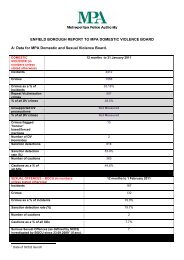
![Appendix 1 [PDF]](https://img.yumpu.com/51078997/1/184x260/appendix-1-pdf.jpg?quality=85)
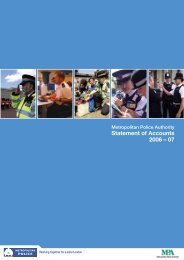
![Transcript of this meeting [PDF]](https://img.yumpu.com/50087310/1/184x260/transcript-of-this-meeting-pdf.jpg?quality=85)
![Street drinking in Hounslow [PDF]](https://img.yumpu.com/49411456/1/184x260/street-drinking-in-hounslow-pdf.jpg?quality=85)
